Related Research Articles

The Last Five Years is a musical written by Jason Robert Brown. It premiered at Chicago's Northlight Theatre in 2001 and was then produced Off-Broadway in March 2002. Since then it has had numerous productions both in the United States and internationally.

Beauty and the Beast is a Disney stage musical with music by Alan Menken, lyrics by Howard Ashman and Tim Rice, and a book by Linda Woolverton. Adapted from Walt Disney Pictures' animated film Beauty and the Beast – which in turn had been based on the fairy tale "Beauty and the Beast" by French author Jeanne-Marie Leprince de Beaumont – Beauty and the Beast tells the story of an unkind prince who has been magically transformed into an unsightly creature as punishment for his selfish ways. To revert into his true human form, the Beast must learn to love a bright, beautiful young lady who he has imprisoned in his enchanted castle and earn her love in return before it is too late.
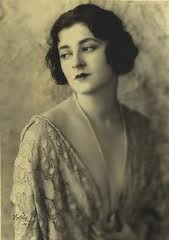
Lucille Lortel was an American actress, artistic director, and theatrical producer. In the course of her career Lortel produced or co-produced nearly 500 plays, five of which were nominated for Tony Awards: As Is by William M. Hoffman, Angels Fall by Lanford Wilson, Blood Knot by Athol Fugard, Mbongeni Ngema's Sarafina!, and A Walk in the Woods by Lee Blessing. She also produced Marc Blitzstein's adaptation of Bertolt Brecht and Kurt Weill's Threepenny Opera, a production which ran for seven years and according to The New York Times "caused such a sensation that it...put Off-Broadway on the map."
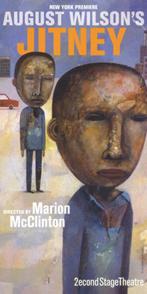
Jitney is a play by American playwright August Wilson. The eighth in his "Pittsburgh Cycle", this play is set in a worn-down gypsy cab station in Pittsburgh, Pennsylvania, in early autumn 1977. The play premiered on Broadway in 2017.
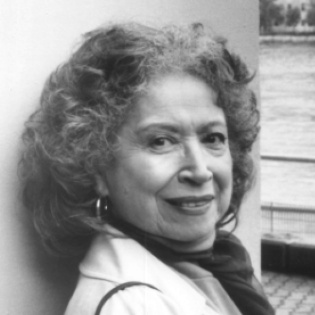
Alice Childress was an American novelist, playwright, and actress, acknowledged as "the only African-American woman to have written, produced, and published plays for four decades." Childress described her work as trying to portray the have-nots in a have society, saying: "My writing attempts to interpret the 'ordinary' because they are not ordinary. Each human is uniquely different. Like snowflakes, the human pattern is never cast twice. We are uncommonly and marvellously intricate in thought and action, our problems are most complex and, too often, silently borne." Childress became involved in social causes, and formed an off-Broadway union for actors.
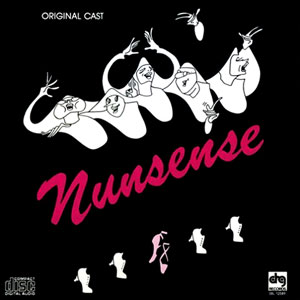
Nunsense (1985) is a musical comedy with a book, music, and lyrics by Dan Goggin. Originating as a line of greeting cards, Goggin expanded the concept into a cabaret show that ran for 38 weeks, and eventually into a full-length musical. The original Off-Broadway production opened December 12, 1985, running for 3,672 performances and becoming the second-longest-running Off-Broadway show in history. The show has since been adapted for television, starring Rue McClanahan, and has spawned six sequels and three spin-offs.
Dutchman is a play written by playwright Amiri Baraka, then known as LeRoi Jones. Dutchman was first presented at the Cherry Lane Theatre in Greenwich Village, New York City, in March 1964 co-produced by Rita Fredricks. The play won an Obie Award; it shared this distinction with Adrienne Kennedy's Funnyhouse of a Negro. Baraka's stage play was made into a film in 1967, starring Shirley Knight and Al Freeman Jr. Dutchman was the last play produced by Baraka under his birth name, LeRoi Jones. At the time, he was in the process of divorcing his Jewish wife, Hettie Jones, and embracing Black nationalism. Dutchman may be described as a political allegory depicting black and white relations during the time Baraka wrote it.

Gigi is a musical with a book and lyrics by Alan Jay Lerner and music by Frederick Loewe. It is based on the 1944 novella Gigi by Colette and 1958 hit musical film of the same name. The story concerns Gigi, a free-spirited teenaged girl living in Paris at the turn of the 20th century. She is being groomed as a courtesan in her family's tradition. Before she is deemed ready for her social debut, she encounters the bon vivant bachelor Gaston Lachaille, whom she captivates as she is transformed into a charmingly poised young lady.
Adrienne Kennedy is an American playwright. She is best known for Funnyhouse of a Negro, which premiered in 1964 and won an Obie Award. She won a lifetime Obie as well. In 2018 she was inducted into the Theater Hall of Fame.

The Penumbra Theatre Company, an African-American theatre company in Saint Paul, Minnesota, was founded by Lou Bellamy in 1976. The theater has been recognized for its artistic quality and its role in launching the careers of playwrights including two-time Pulitzer Prize-winner August Wilson.

Hilda Simms was an American stage actress, best known for her starring role on Broadway in Anna Lucasta.
Funnyhouse of a Negro is a one-act play by Adrienne Kennedy. The play opened off-Broadway in 1964 and won the Obie Award for Distinguished Play. The play shared this award with Amiri Baraka's Dutchman, and was influenced by her radical imagination; critics have read it in conversation with both the Black Arts Movement and the Theater of the Absurd. While the play has been produced on stage numerous times, it has been more frequently studied in academic settings than it has been produced.

Adrienne Warren is an American actress, singer and dancer. She made her Broadway debut in the 2012 musical Bring It On, and in 2016 received a Tony Award for Best Featured Actress in a Musical nomination for her performance in Shuffle Along, or, the Making of the Musical Sensation of 1921 and All That Followed. She was also praised for her role as Tina Turner in the West End production of Tina in 2018, and for the same role in the Broadway production, for which she received the Tony Award for Best Actress in a Musical in 2020.

Laurie Dorothea Carlos was an American actress and avant-garde performance artist, playwright and theater director. She was also known for her work mentoring emerging artists in the theater.
Ludlow Fair is a one-act play by American playwright Lanford Wilson. It was first produced at Caffe Cino in 1965, a coffeehouse and theatre founded by Joe Cino, a pioneer of the Off-Off-Broadway theatre movement.

Billie Allen was an American actress, theater director, dancer and entertainer. Allen was one of the first black actors and performers to appear on television and stage in the United States, at a time when those venues were largely closed to African Americans. During the 1950s, Allen became one of the first black entertainers to have a recurring role on network television when she was cast as a WAC on staff on the CBS army base comedy The Phil Silvers Show, from 1955 to 1959. She was one of the first African Americans to appear on television commercials in the U.S. She was also one of the earliest African-American actors on daytime soap operas as she appeared in the mid-1950s as the character Ada Chandler on the popular daytime soap opera The Edge of Night. Allen was also known for her work on Broadway and off-Broadway.
Lou Bellamy is an American stage director, actor, producer, entrepreneur, and educator. He is the founder and artistic director, Emeritus of Penumbra Theatre Company in St. Paul, Minnesota. He taught at the University of Minnesota from 1979 until his retirement as an associate professor in 2011.
A Movie Star Has to Star in Black and White is a one-act play split into three scenes written by Adrienne Kennedy and first performed in 1976. Actors are made to look like famous film stars Marlon Brando, Paul Henreid, Montgomery Clift, Jean Peters, Bette Davis, and Shelley Winters. The supporting roles of this story are Clara, her mother, father, brother, and husband. The settings of the three scenes take place on the sets of movies, as well as a "real place": Now Voyager/ hospital lobby, Viva Zapata!/ Clara's brother's hospital room, and A Place in the Sun/ Clara's old room.
A Rat's Mass is a poetic, magical-realist one-act play written in 1967 by African-American playwright Adrienne Kennedy. The play portrays the negative aspects of the black experience in the United States by depicting two African-American children longing for a white child. The play was, like many of Kennedy's plays, not aligned with the Black Arts movement, with a focus on dislocation and femaleness rather than the ideology of blackness.
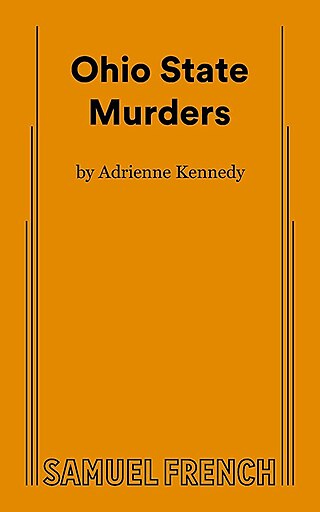
Ohio State Murders is a play written by Adrienne Kennedy. The play was first published on January 14, 1991.
References
- 1 2 Kennedy, Adrienne (1988). Adrienne Kennedy in ONE ACT . Minneapolis MN: University of Minnesota Press. p. 25. ISBN 0-8166-1691-4.
- ↑ Andrews, William L.; Foster, Frances Smith; Harris, Trudier (15 February 2001). The Concise Oxford Companion to African American Literature. Oxford University Press. p. 243. ISBN 9780198031758.
- ↑ Kennedy, Adrienne (1 January 1969). Cities in Bezique: Two one-act plays. S. French.
- ↑ "Owl Answers, The | Samuel French". www.samuelfrench.com. Retrieved 10 April 2016.
- ↑ Cervenak, Sarah Jane (18 August 2014). "Writing Under a Spell:Adrienne Kennedy's Theater". Wandering: Philosophical Performances of Racial and Sexual Freedom. Duke University Press. ISBN 9780822376347.
- ↑ Overbeck, Lois More (1 January 1992). Intersecting Boundaries: The Theatre of Adrienne Kennedy. U of Minnesota Press. p. 26. ISBN 9781452900353.
- ↑ "Some Day Adrienne Kennedy Will. . ". The New York Times. 19 January 1969. ISSN 0362-4331 . Retrieved 21 April 2016.
- ↑ "Review: 'Dutchman' and 'The Owl Answers' at Penumbra Theatre". www.minnesotamonthly.com. 10 March 2016. Retrieved 21 April 2016.
- ↑ Salem, James M. (1 January 1984). A Guide to Critical Reviews: American drama, 1909-1982. Scarecrow Press. ISBN 9780810816909.
- ↑ "Review: The Owl Answers". Bwog. 29 April 2013. Retrieved 21 April 2016.
- ↑ "Talkin' Broadway Regional News & Reviews - "Dutchman" and "The Owl Answers" - 3/6/16". www.talkinbroadway.com. Retrieved 21 April 2016.
- ↑ Duane, Olson Jacob. "The Owl Answers (And Sun)". www.fordham.edu. Retrieved 21 April 2016.
- ↑ TDM. "Current Productions (The Owl Answers)". tdm.fas.harvard.edu. Retrieved 10 October 2017.